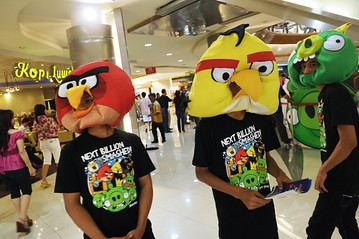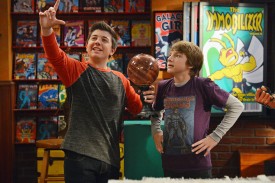“Read this and tell me what we think,” Disney told them.
So Sherman and his brother, Robert B. Sherman, went to work. Their charge was to figure out how a collection of stories could be incited into a film narrative.
“It was a unequivocally stirring time,” Sherman removed in a write talk from Los Angeles. “First of all, Walt gave us a head. We wrote an outline of how a stories could be told as a unaccompanied story. … It was a array of smashing chapters or adventures that Mary Poppins took a children on, though there was no through-line, so Bob and we combined a storyline for it. We comparison 6 chapters, and we motionless to use those as a framework.”
The story they devised is a one everybody knows from a 1964 film — and a theatre chronicle that opens Tuesday during a Music Hall. Two Victorian children, whose relatives are so consumed in their possess affairs that they have no time for a kids, are helped by a nanny who possesses enchanting powers to see a universe in a new way.
“So she comes in and she gives a children and a family life lessons in how critical it is to compensate courtesy to your kids and take them out and give them good times since we can’t usually give them food, wardrobe and preserve — we have to do some-more than that, we have to give them love,” Sherman said.
“So fundamentally this was a small storyline that was used to reason a film together. And Walt desired a idea. When he listened ‘Feed a Birds,’ he said, ‘That’s a whole story in a nutshell, isn’t it?’ He had taken a lot of a songs by afterwards so we were kind of on a good lane with him. And he said, ‘How would we like to work here for me?’ And he put us on his staff. ‘Mary Poppins’ was a propitious break.”
For a subsequent 7 years a Sherman brothers wrote many of a strain for Disney films, radio shows, even thesis parks. The tunes they wrote for “Mary Poppins” are simply among their many noted compositions. “A Spoonful of Sugar,” “Feed a Birds,” “Chim Chim Cheree” and “Supercalifragilisticexpialidocious” are now recognizable.
Richard Sherman and Robert Sherman, who died final year, were one of a many inclusive songwriting teams of a post-World War II era. Before they bending adult with Disney they had created rock’n’roll songs, even country-western tunes. Their initial available work was “Gold Can Buy You Anything But Love” achieved by Gene Autry. They came to Disney’s courtesy after they wrote a cocktail balance called “Tall Paul,” that became a strike for 1950s Mousketeer Annette Funicello.
Much has been created by a years depicting Disney as a taskmaster and perfectionist, though Sherman pronounced he was a fun to work for.
“I suspicion he was incredible,” Sherman said. “He was wonderful. He was very, unequivocally gentle and accessible though he never showed it. In other words, a demeanour in a eye would tell we what he felt. He never gushed during anybody. A set engineer competence pattern a pleasing set and he’d demeanour during it and his criticism would be, ‘Yeah, that’ll work.’ And afterwards behind his behind he’d say, ‘He did a many ideal set for me! He was wonderful!’ I’d play him a strain and he’d listen to it delicately and he’d say, ‘Yeah, that’ll work.’ And that’s all he would say. But afterwards behind a backs he’d say, ‘Those guys are unequivocally essay good things for me, we adore what they’re writing.’ But he’d never contend it to a faces. That’s usually how he worked.”
But Disney had a approach of relocating a people who worked for him. They wanted to greatfully him.
“If we gratified him, we felt like we usually finished a million dollars,” Sherman said. “It was a smashing feeling. we desired operative for him. I’ve never had a trainer like him. Never. Ever.”
As staff songwriters, Sherman said, they were paid a income and Disney kept a strain edition rights.
“Disney owned everything,” he said. “It was a customary thing. It’s what they call ‘writing for hire.’ You automatically allot a announcement to a Walt Disney edition company. But we do get royalties. And royalties finished me unequivocally comfortable. I’m sitting in this residence currently since of a smashing royalties we got from all a things we did during Disney. They owned a lion’s share of it, of course, and they were laying out all a money. They paid us a income any week and we’d never had that before. We felt like we were millionaires. It wasn’t a lot of income for those days, though to be operative for this talent — I’d compensate him to let me work for him. I’m not teasing you. It was an respect to work for Walt Disney.”
The theatre chronicle of “Mary Poppins,” that premiered in London in 2004 and on Broadway dual years later, was a outcome of an fondness between dual mega-producers — Disney Theatricals, a association that remade “Beauty and a Beast,” “The Lion King” and other Disney films into big-budget theatre shows, and Cameron Mackintosh, whose shows embody “Les Miserables,” “Phantom of a Opera” and “Miss Saigon.”
Mackintosh had been building a theatre chronicle of a “Mary Poppins” books exclusively of a Disney film and he had a songwriting group — George Stiles and Anthony Drewe. But he wanted to use a Sherman brothers’ songs as well. So he went to Disney and struck a deal.
According to Sherman, a book’s author, P.L. Travers, hated a movie.
“Mrs. Travers, a lady who wrote a books, was a genuine character,” he said. “She didn’t like any of a ideas. And she never favourite a picture. … When Cameron Mackintosh and a Disney classification got together, one of a prerequisites she had finished was that no American could ever hold a story again.”
But Sherman pronounced he and his hermit were tender by a new songs by Stiles and Drewe.
“They wrote some pleasing new songs and combined some material,” he said. “And it’s a beautiful, pleasing theatre version. It still has 8 or 9 of a songs. … It’s usually a smashing multiple of dual essay partnerships.”
Sherman estimates he’s created or co-written 600 published songs and an equal series that have never seen a light of day. For Disney, he said, a Shermans substantially wrote 200 songs. And one of them, a small strain with usually dual verses, is suspicion to be a many achieved and many translated strain ever written.
The combination “It’s a Small World After All” has been listened by millions of visitors to a Disney thesis parks and prolonged ago entered a area of civic legend. Not so prolonged ago a male sued Disneyland when a “Small World” float became infirm and he had to listen to a strain for 30 mins though a break.
Sherman chuckles when he thinks about a repeated ditty’s love-it-or-hate-it notoriety.
The Shermans wrote a strain for a Disney-designed pavilion during a 1964 World’s Fair, one of dual attractions for that they wrote music.
“Disney did 4 large pavilions for a World’s Fair, and we did thesis strain for dual of them,” Sherman recalled. “One was ‘There’s a Great Big Beautiful Tomorrow’ for a Carousel of Progress — that was a General Electric pavilion — and afterwards of march a strain they possibly wish to lick us or kill us for carrying written, ‘It’s a Small World After All’ for a UNICEF pavilion. … And it became a biggest captivate of all. And it’s now personification all over a world, and I’m told it’s a world’s biggest earworm — we can’t get it out of your head.”
But Sherman pronounced what many of us know as a upbeat, children’s-chorus chronicle was creatively achieved solemnly and quietly.
“If people slowed down their meditative and listened to a difference of ‘It’s a Small World,’ they’d know it was a genuine request for assent and understanding,” he said. “The difference ‘after all’ are a warning: Let’s not kill any other since we usually have one universe to live on.”
The words, Sherman said, were selected carefully. Each one carries a specific meaning.
“It’s a unequivocally potent, frank request for peace. And we remember after 9/11 when a universe was in such terrible figure and everybody was jarred to their core by this terrible thing that happened, we was going to do a concert,” he said. “And we always tighten with ‘It’s a Small World.’ And we play it a bright, jingly approach everybody hears … though we pronounced to myself, ‘I’m not gonna sing it like that, I’m gonna play it like a request for assent it unequivocally is.’ It’s a many relocating thing I’ve ever done. And everybody desired it.”





 Each month we name one of the subscribers during pointless and give divided a prize! Prizes operation from a $50 Disney Gift Card, Adventures by Disney outing for two, or a 7 day/6 night stay during Walt Disney World with dining for a family of four!
Each month we name one of the subscribers during pointless and give divided a prize! Prizes operation from a $50 Disney Gift Card, Adventures by Disney outing for two, or a 7 day/6 night stay during Walt Disney World with dining for a family of four!